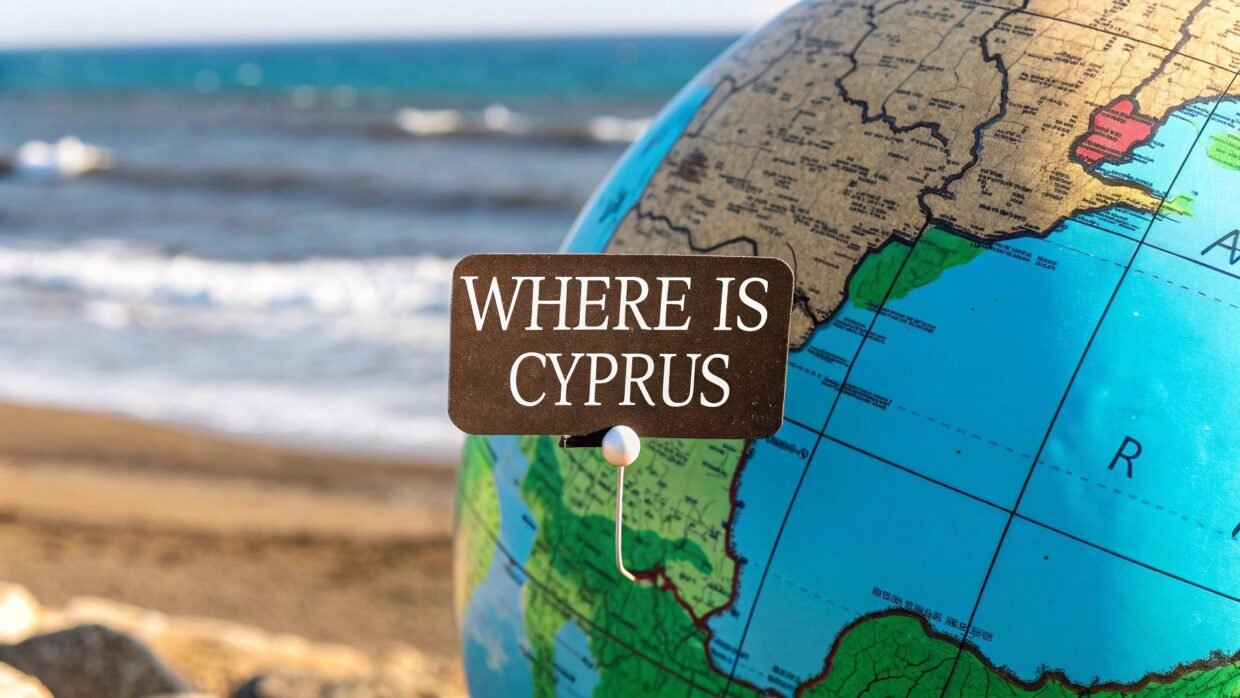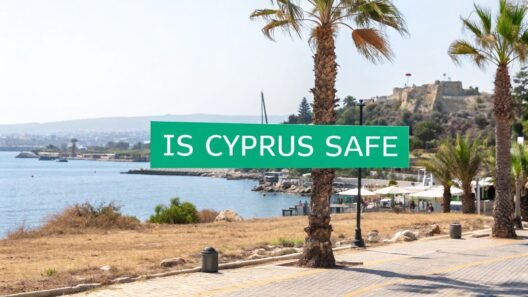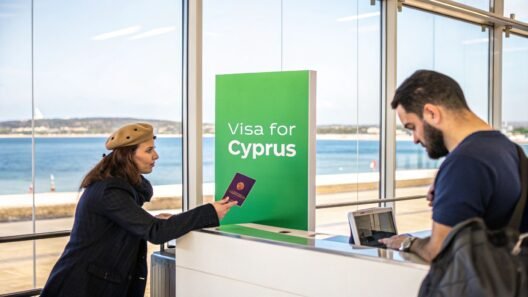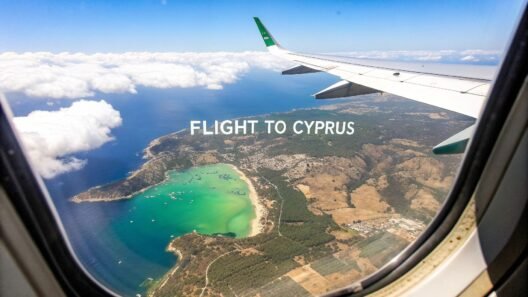Alright, let's get straight to the heart of the matter: Where is Cyprus? Picture an island nation firmly planted in the easternmost corner of the Mediterranean Sea. It's a true crossroads of continents, sitting just south of Turkey, west of Syria and Lebanon, north of Egypt, and to the southeast of Greece.
Pinpointing Cyprus On The World Map
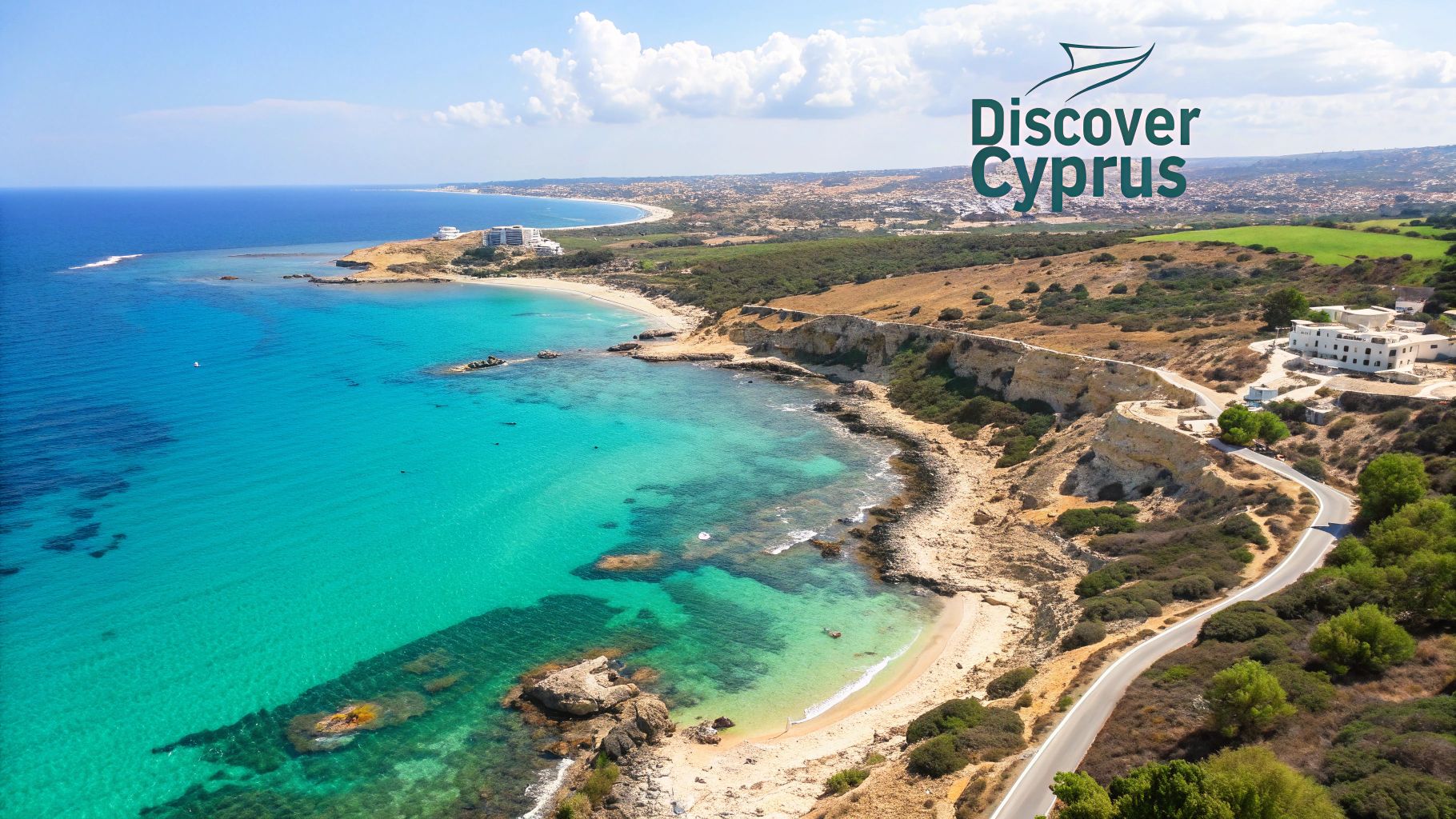
Here's where things get interesting. While Cyprus sits geographically in Asia, its heart and soul are firmly European. Politically and culturally, it aligns with Europe and has been a full member of the European Union since 2004. This dual identity is what makes it such a fascinating melting pot. Its location isn't just a dot on a map; it's the very reason for its incredibly rich and often complex history.
If you want to get precise, the island’s coordinates are roughly 35° N latitude and 33° E longitude. For centuries, this exact spot made it a coveted prize for empires, from the ancient Greeks and Romans to the Ottomans and the British. You can feel the influence of each civilisation in the island's culture, architecture, and daily life.
To get a quick snapshot of the island's core details, this table breaks it down nicely.
Cyprus at a Glance
| Attribute | Detail |
|---|---|
| Location | Eastern Mediterranean Sea |
| Continent (Geographic) | Asia |
| Political Affiliation | Europe (EU Member) |
| Approximate Coordinates | 35° N, 33° E |
| Area | 9,251 sq km |
| Closest Neighbours | Turkey (75 km north), Syria (105 km east) |
| Status | Third-largest island in the Mediterranean |
These details provide a great foundation for understanding why Cyprus is the way it is today.
Before planning a trip, it’s also important to understand the island’s internal layout. Cyprus is divided, a political reality that has shaped the island for decades and is something any visitor should be aware of. To get a better handle on this, you can dive into a more comprehensive guide that explains the specifics of where is Cyprus.
This unique blend of location and history is exactly why Cyprus remains such a vital destination for travel, business, and international relations. It truly is an island at the centre of the world.
The Neighbourhood: Cyprus and Its Strategic Neighbours
To get a real sense of where Cyprus is, you have to look beyond a simple dot on a map. Think of it more like a central house in a very busy, influential neighbourhood. Its unique spot, nestled between three continents, means its story and identity are completely woven into the fabric of its powerful neighbours across the sea.
Just 75 kilometres to the north lies Turkey. This short distance across the water is arguably the most significant geopolitical factor for modern Cyprus. It shapes everything from politics to culture, especially in the northern part of the island, making it a constant and palpable presence.
Head southeast, and you'll find Greece. While it's geographically further away than Turkey, the Hellenic connection is the cultural and historical heartbeat for Greek Cypriots. You see it in the language, feel it in the Orthodox faith, and taste it in the food. It’s a perfect example of how proximity isn't just measured in kilometres but in shared heritage.
A Bridge Between Continents
Casting your eyes east and south, Cyprus’s role as a bridge between Europe and the Middle East really comes into focus. Syria is a mere 105 kilometres away, with Lebanon just a little further. For centuries, this has made Cyprus a critical crossroads for trade, a centre for diplomacy, and, during turbulent times, a safe haven for people from the region.
You could say Cyprus is the European Union’s southeastern-most doorstep—a frontier where vastly different cultures, economies, and political worlds converge. This gives the island an influence that punches well above its weight.
Further to the south is Egypt, another ancient powerhouse that has traded goods, ideas, and people with Cyprus for thousands of years. It's this unique collection of neighbours that truly underscores the island's incredible strategic value.
So, who are the key players in Cyprus's corner of the world?
- Turkey: The closest and most politically influential neighbour to the north.
- Greece: The primary cultural and historical ally to the southeast.
- Syria & Lebanon: The eastern neighbours that cement its status as a gateway to the Middle East.
- Egypt: A major regional power to the south, completing the circle of influence.
Getting your head around this regional dynamic is crucial. It’s what makes Cyprus far more than just a sun-soaked holiday spot; it’s a complex, dynamic, and historically rich nation shaped by the powerful forces all around it.
The Enduring Connection Between Cyprus and the UK
For many Brits, the question "where is Cyprus?" feels familiar, even if they can't quite pinpoint it on a map. This isn't just a happy accident; it's the result of a long and complex history that has tied the two nations together for more than a century. Our story begins back in 1878, a time when geography was destiny.
It all started when Britain gained administrative control of Cyprus from the Ottoman Empire. The real prize wasn't the island itself, but its prime location. With the Suez Canal newly opened, Britain needed a strategic foothold in the eastern Mediterranean to guard the crucial sea routes to its empire in India. Cyprus was the perfect watchtower.
A Legacy Cast in History
This British chapter in Cyprus's story lasted for 82 years, leaving an indelible mark that shaped the island we know today. After formally annexing Cyprus in 1914, Britain declared it a Crown Colony in 1925. During this time, significant infrastructure was built, including a new harbour at Famagusta in 1906, which solidified the island’s role as a vital naval base. You can delve into the full story of this lasting relationship between Cyprus and the UK to see how deep the roots go.
Even after Cyprus declared its independence in 1960, the ties remained. The UK kept two Sovereign Base Areas, Akrotiri and Dhekelia, which are still British Overseas Territories. These bases are a living legacy of the island's strategic past and a unique political arrangement that continues to link the two countries. This shared history is also why English is spoken so widely and why you'll spot British influences all over the island, from the legal system to the plug sockets.
This shared past is far more than a historical footnote. It’s the bedrock of the modern relationship, influencing tourism, trade, and the vibrant Cypriot community that calls the UK home.
Of course, it’s not just history that draws Brits to the island. There’s also the famously fantastic weather. The image below gives you a glimpse of the glorious climate you can expect.
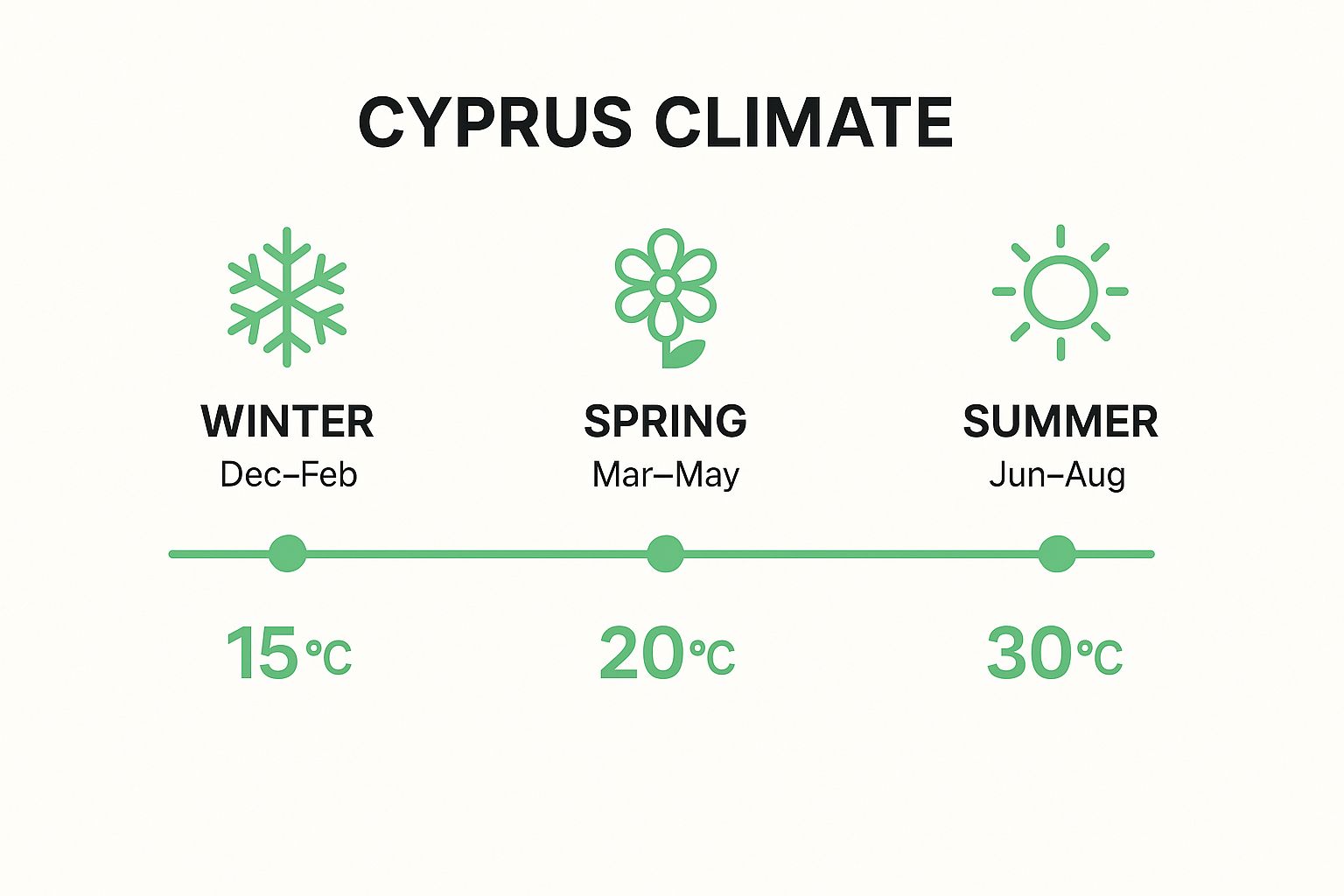
As you can see, Cyprus offers wonderfully mild winters and long, sun-drenched summers, making it a perfect getaway no matter the time of year.
How People and Culture Connect the UK and Cyprus
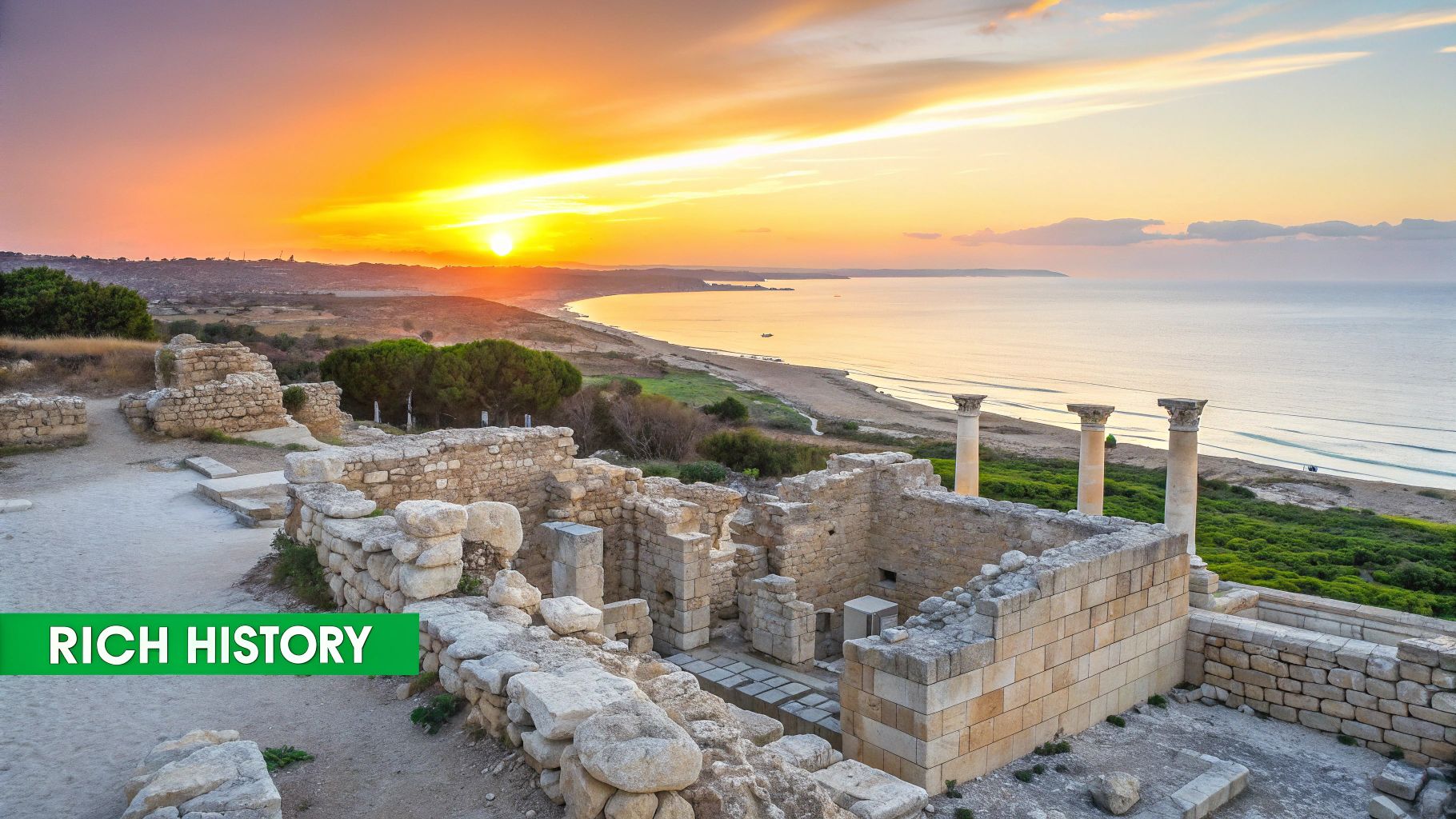
While history forged the initial link between Cyprus and the United Kingdom, it’s the personal connections between everyday people that truly keep that bond alive and kicking. For many Brits, the answer to "where is Cyprus?" isn't just a spot on a map—it's found in their own neighbourhoods, local businesses, and circle of friends.
This living bridge is most obvious when you look at the vibrant Cypriot community right here in the UK. An estimated 300,000 Cypriots now call the United Kingdom home, making it one of the largest communities of Cypriot heritage outside the island itself. They’ve deeply enriched Britain’s cultural landscape while keeping a strong connection to their homeland. You can read more about these enduring Cyprus-UK relations and their modern-day significance.
A Bridge of Education and Opportunity
The relationship isn't just rooted in the past; it’s constantly being refreshed by the younger generation. The UK has long been the number one destination for Cypriot students looking to pursue higher education, thanks in large part to the shared history and the widespread use of English on the island.
It's a staggering figure when you think about it: at any given time, there are roughly 40,000 Cypriot students studying at UK universities. This represents about 1% of the entire population of Cyprus, a massive testament to the value placed on a British education.
This constant exchange of people and ideas ensures the bond between the two nations is dynamic and always evolving. It's built on a foundation of real-life connections:
- Family: Countless British Cypriots maintain deep ties to their ancestral villages, visiting family and keeping traditions alive.
- Culture: From food festivals to music, Cypriot culture is a celebrated part of daily life in many UK cities.
- Education: Shared academic experiences forge professional and personal networks that last a lifetime.
Ultimately, this human element gives the UK-Cyprus relationship its unique warmth. It’s a story told not in dusty treaties, but across dinner tables, in bustling high street bakeries, and within university lecture halls.
Why Brits Choose Cyprus for Holidays and Homes
It’s no secret that Brits have a long-standing love affair with Cyprus. Beyond the shared history, the island’s modern appeal is magnetic, drawing in holidaymakers and expats alike. It has firmly established itself as more than just a place for a two-week getaway; for many, it's the perfect place to build a new life.
What’s the biggest draw? Unsurprisingly, it’s the glorious Mediterranean climate. With over 300 days of sunshine a year, it’s a world away from the famously unpredictable British weather. That, combined with breathtaking coastlines and pristine Blue Flag beaches, makes for a pretty compelling reason to pack your bags.
But the connection goes much deeper than just the weather. English is spoken almost everywhere, which instantly removes any language barrier. This simple fact makes everything—from ordering a coffee to dealing with paperwork—so much easier, creating a genuinely comfortable and welcoming atmosphere for Brits from the moment they arrive.
A Home Away From Home
The British presence in Cyprus isn't a recent development. The real boom in tourism and property ownership from the UK happened back in the 1980s and 1990s, cementing the island's reputation as a go-to destination. This wave saw a huge number of Brits buying homes, which in turn created the vibrant expat communities we see today and strengthened the economic ties between the two countries. You can find more detail in the various insights on UK-Cyprus relations published over the years.
For many, Cyprus strikes the perfect balance. It offers a familiar, friendly culture, but with the incredible backdrop of a sun-drenched Mediterranean island. It’s a combination that has proven irresistible for generations of Brits.
This lasting popularity means there’s a solid infrastructure in place that caters to British tastes. You’ll find familiar products in the supermarkets, and there are countless social clubs and community groups to join. If you're thinking about making the leap yourself, checking out guides on long-term rentals in Cyprus is a great place to start understanding the practical side of things.
A Practical Guide to the Island's Division
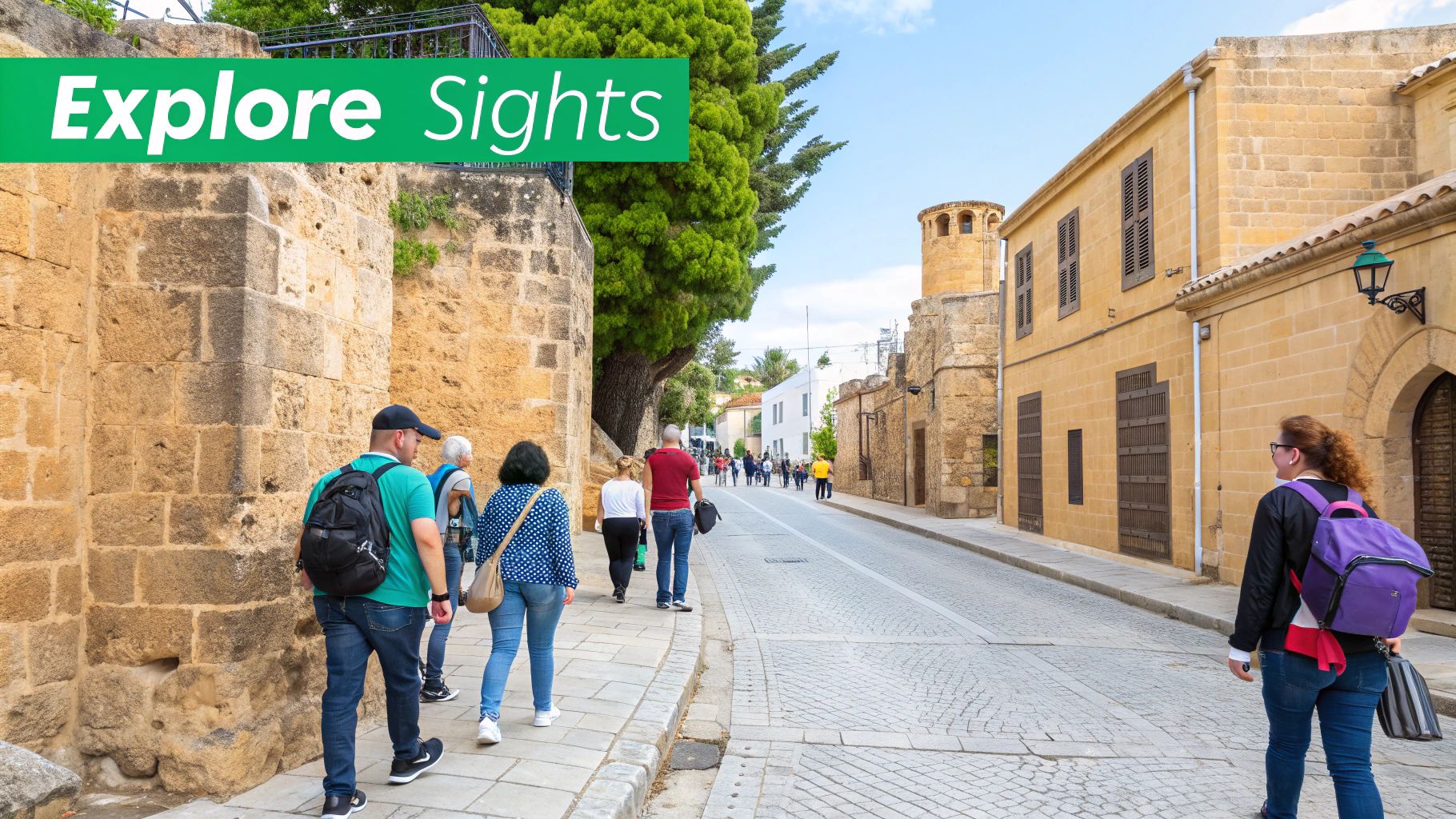
To really answer the question "where is Cyprus?", you have to look beyond the map and understand its modern reality. Since 1974, the island has been divided. The southern part is the Republic of Cyprus, which is internationally recognised and a member of the EU. The northern part is administered by Turkish Cypriots.
This split has created a truly unique situation for anyone visiting. A UN-patrolled buffer zone, known as the 'Green Line', snakes for about 180 kilometres right across the island, separating the two areas. It even slices through the capital, Nicosia, making it the last divided capital in the world. As a traveller, this has a few practical implications you'll want to be aware of.
Crossing Between North and South
First things first: the internationally recognised way to arrive in Cyprus is through the legal ports of entry in the Republic of Cyprus. This means flying into airports like Larnaca (LCA) or Paphos (PFO). Most foreign governments advise their citizens to enter the island this way.
For travellers, the division isn't a barrier to exploring the entire island. Think of it as a unique circumstance that just requires a bit of awareness. Following the correct procedures allows you to have a respectful and complete Cypriot experience.
Moving between the south and north is actually quite simple at one of the several designated checkpoints. You'll just need to show your passport to the officials on both sides of the line. There are a couple of things to keep in mind:
- Rental Car Insurance: Most car hire agencies based in the south won't cover you for driving in the north. You'll almost certainly need to buy separate, third-party insurance at the border crossing.
- Currency: The south uses the Euro (€). In the north, the main currency is the Turkish Lira (TRY), although you'll find that Euros are widely accepted in many tourist spots.
Getting your head around this layout is the key to a smooth and respectful trip, letting you navigate the entire island with confidence.
Frequently Asked Questions About Cyprus
Now that you have a better sense of where Cyprus is on the map, you’re probably left with a few practical questions. Let's tackle some of the most common ones that pop up when planning a trip to this beautiful island.
Is Cyprus in Europe or Asia?
This is a classic question, and the answer isn't a simple 'yes' or 'no'—it's a bit of both, which is what makes Cyprus so unique.
Geographically speaking, the island is planted firmly in Asia. It sits on the Anatolian tectonic plate, much closer to the coastlines of the Middle East than to mainland Europe.
But when it comes to culture, politics, and heart, Cyprus is overwhelmingly European. The Republic of Cyprus has been a full member of the European Union since 2004 and uses the Euro. So, it's best to think of it as a country with an Asian address but a distinctly European soul.
What Is the Best Way to Travel to Cyprus from the UK?
Getting to Cyprus from the UK couldn't be easier. By far the most popular and practical way is to fly directly from one of the UK's major airports.
You'll be heading to one of two international airports in the Republic of Cyprus:
- Larnaca International Airport (LCA), conveniently located on the southeast coast.
- Paphos International Airport (PFO), found on the island's southwestern tip.
With an average flight time of just 4.5 to 5 hours, a stunning Mediterranean escape is closer than you think.
While the sun and sea are major draws, the food scene in Cyprus is an adventure in itself. Once you've booked your flights, why not plan your feasts by checking out the top 10 best restaurants in Cyprus for 2025?
Do I Need a Visa to Visit Cyprus from the UK?
For the vast majority of British holidaymakers, the answer is no. UK citizens don't need a visa for short trips to the Republic of Cyprus. This rule typically allows for a stay of up to 90 days within any 180-day period.
A word of advice, though: travel rules can always change. It's a smart habit to check the latest official government travel advice before you finalise any bookings, just to be on the safe side.
At SayCyprus, we're dedicated to helping you discover every corner of this beautiful island. Explore our guides to plan your perfect trip, from hidden beaches to vibrant city life. Find your next adventure at https://www.saycyprus.com.









